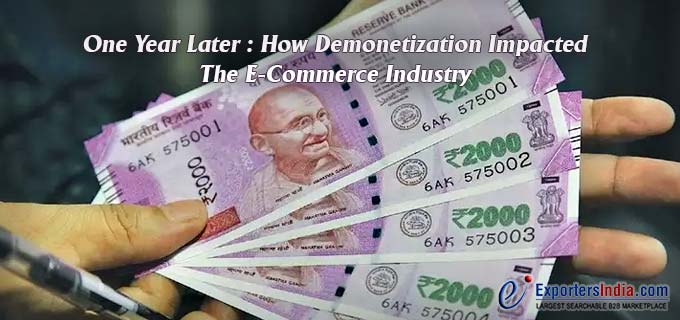
On a regular evening around a year back, India came to a standstill and the date got etched in the pages of Indian history as the Demonetization day. It was on November 8th, 2016, around a year ago that the government of India ceased the legal tender from the 500 and 1,000 rupee notes. In a surprising television broadcast, the PM announced that 86% of the total money in circulation in the country would turn into trash. This move, publicized as demonetization, was supposed to exclude the fake note circulation, curb corruption & terrorism, and force out the stashed black money. It has been a year since the elimination of the old 500 and 1,000 rupees notes from Indian currency but the intended effect are still far from being seen.
The impact of this move was seen in each and every sector of the Indian economy. From retail and real estate to e-commerce and other small businesses, each and every sector saw was left aghast by this starting move. The long-term, as well as the immediate impact of this move, became the hottest topic of discussion among the financial analysts. Apart from all the other sectors, the e-commerce sector was one which was expected to have a positive impact of demonetization.
Immediate Effect Of Demonetization On E-Commerce
The immediate effects of demonetization stirred the whole nation and brought many small businesses to a standstill. Moreover, the number of e-commerce transactions declined in the two months following the demonetization move. The cash crunch and the lowered cap on ATM withdrawal limit affected the buying capacity of the online buyers, especially those who lived in tier-2 and tier-3 cities. Those who opted for cash on delivery aka COD payment mode were left without cash to make the payment which left many orders undelivered. Many online retailers even suspended the COD payment gateway to reduce the status of undelivered and stagnant orders. The overall growth of e-commerce during the last quarter of 2016 downgraded and many e-commerce players, startups and other small businesses saw a heavy blow because of this move.
Demonetization Impact On E-Commerce After One Year
It has been more than a year since demonetization stirred the entire nation. Many financial experts have called the note ban move a hyped and wasted effort, while others have considered it to have a positive impact on the digital economy of the nation. While the sales in the e-commerce sections were spurred by the move, today, after a year, it is certain that it has encouraged digital payment in India, thus increasing the sales. In fact, the first quarter of 2017 itself saw a positive change in the digital gateways that encouraged the Indian buyers to make more payments through online modes. A report published in NITI Ayog specified that digital payments saw a whopping surge of 271% in December 2016-January 2017 itself.
The reduction in payments via cash on delivery is one of the main benefits that demonetization has brought to the nation. COD has always involved a higher risk of returns and even additional cost; the cutting down on the COD payment method has definitely benefitted the e-commerce industry. Many payment gateways, Unified Payments Interface (UPI), and mobile wallets like BHIM, Paytm, FreeCharge, Mobikwik, have been introduced to tackle and even encourage the surge in digital payment.
However, except the increase in online payment methods, some positive effects have been seen in the e-commerce industry because of demonetization. The sale dropped for most of the e-commerce companies and even the delivery service provided by the logistics company was also brought to a standstill, especially during the last quarter of 2016.
Another e-commerce section which benefitted largely from demonetization and is still gaining popularity is the hyper-local section that sells groceries, vegetables, fruits, and other household items online. The cash crunch led people to turn towards online grocery stores to buy their daily essentials. Demonetization impact on small business was also majorly seen when many small businesses went online and started accepting card payments and installing virtual payment gateways. Whatever be the case, the future of India’s e-commerce section certainly looks promising post demonetization.
Add Comment